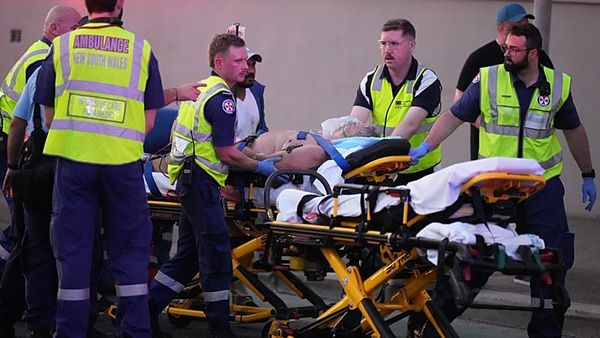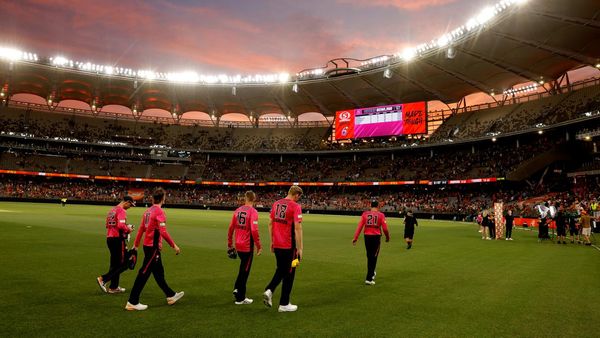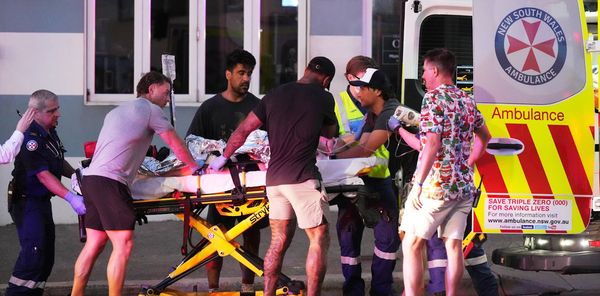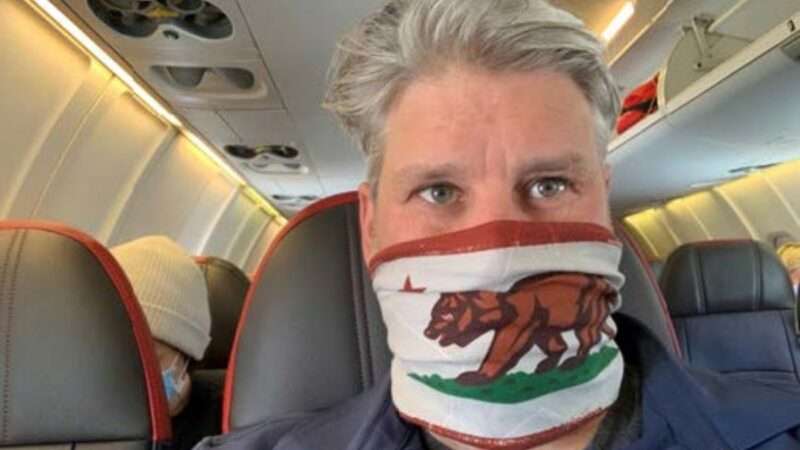
On Independence Day last year, Michael Lowe, a tour guide from Flagstaff, Arizona, was vacationing in Tucumcari, New Mexico, when he encountered local police officers who were investigating a disturbance. As part of their investigation, they asked Lowe and his friends for identification, which led to his arrest after the cops found that he had two outstanding warrants in Tarrant County, Texas. The baffled man ended up spending 17 days in a filthy, overcrowded "quarantine pod" at the Quay County Detention Center in Tucumcari, where he barely slept and worried constantly about the ever-present danger of violence.
Lowe initially had no idea what was going on: He did not know where exactly Tarrant County, Texas, was, let alone why he might be wanted for crimes there. Eventually he discovered that American Airlines had mistakenly identified him as a shoplifting suspect after he flew from Flagstaff to Reno, Nevada, on May 12, 2020. That egregious, life-changing error seems inexplicable based on the facts described in a negligence lawsuit that Lowe filed against the company on Monday.
"I've never heard of this fact pattern in my life or my career," Scott H. Palmer, the Dallas-area lawyer who is representing Lowe, told the Fort Worth Star-Telegram, which described the case in a story published today. "If it can happen to him, it can happen to anyone."
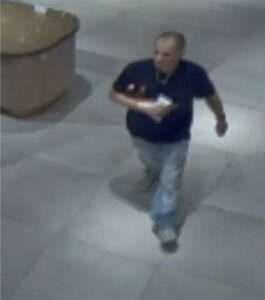
During that May 2020 trip, Lowe changed planes at the Dallas/Forth Worth International Airport (DFW), which is located in Dallas and Tarrant counties. Surveillance camera footage (see right) showed a different passenger on the same American Airlines flight from Dallas to Reno carrying merchandise allegedly stolen from a duty-free shop at DFW. The suspect in the video—whom DFW police described as a tall and thin white or Hispanic male with a short, military-style haircut, wearing a black polo shirt and blue jeans—bore little resemblance to Lowe, who at the time had bushy gray hair and was wearing a blue jacket over a gray T-shirt (see below).
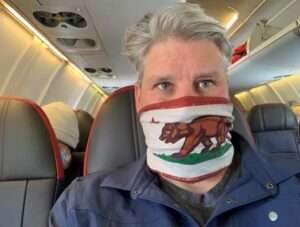
When DFW police obtained a warrant for information about passengers on that flight, however, the airline for some reason responded with information about just one passenger: Lowe. As a result, police obtained warrants for felony burglary and misdemeanor criminal mischief against Lowe on June 30, 2020. At that moment, unbeknownst to him, Lowe became a fugitive from justice. The warrants were added to the National Crime Information Center database, which is what triggered his arrest in Tucumcari more than a year later.
Lowe initially was confident that the matter would be sorted out in short order once the cops realized they had the wrong guy. But according to his lawsuit (which was filed in Tarrant County, where American Airlines is based), he quickly realized that "his protestations were not merely falling on deaf ears but appeared to be antagonizing the jailers." Lowe was subjected to a strip search and detained alongside "gang members, habitual offenders and inmates who were in for violent offenses." At first, Lowe was worried about catching COVID-19, a risk that soon was superseded by graver, more immediate concerns.
Because there were not enough cots to accommodate all of the prisoners, Lowe initially was "forced to sleep on the concrete floor." Even after he secured a metal cot, the lawsuit says, his low position in the jail pecking order meant that he "was invariably assigned a mat incapable of inflation due to multiple holes."
The complaint describes "grossly unsanitary" conditions in which "the smell of urine and feces kept the air so pungent that Mr. Lowe was often forced to breathe through his mouth and use [his] jail clothing to cover his nose." The "shared shower facility," where "rusted rebar" was "sticking out" through "cracked tile," offered "no relief from the filth," since "inmates routinely urinated in the drain, even when not showering." When Lowe asked for cleaning supplies, he says, he was "given a spray bottle with water and just a hint of disinfectant and a filthy mop with no bucket."
The jail staff's neglect was apparent in other ways. One prisoner "was vomiting and moaning for three days straight." When Lowe and several other inmates pleaded with the guards to "take the sick inmate to a doctor or nurse," the guards "insisted that the inmate was just suffering from withdrawal." That inmate "remained in the same condition" when Lowe was finally released, and "Mr. Lowe continues to wonder if he survived."
The unit was noisy as well as unsanitary. "Some inmates would bang on the walls and yell for hours on end," the complaint says. "Another inmate, who was denied the medication needed to manage his psychiatric conditions, would scream random and incoherent church hymns throughout the night."
In addition to the discomfort, stench, and noise, Lowe was plagued by the anxiety that he could be attacked at any moment. "For 17 days and nights," the complaint says, "Mr. Lowe lived in a constant state of fear of confrontation or abuse. Violent outbursts arose over any trivial act—the use of the shared television, access to the phones in the pod. Mr. Lowe was forced to watch when a young inmate was punched in the face three times in rapid succession by an older inmate for no apparent reason. A week later, a wall remained stained with the young inmate's blood."
The complaint says Lowe suffered from "a near[ly] complete lack of sleep over the entire 17 days of his incarceration." Because he was especially worried about the danger of assault in the shower, he "went days without showering, waiting until he could no longer bear the physical discomfort from the filth of his condition." He says he showered just four or five times during his 17 days in jail.
The conditions that the lawsuit describes should be viewed as intolerable for all jail inmates, whether they have been convicted or are awaiting trial after being arrested based on probable cause. But the situation was especially traumatic for a verifiably innocent man who did not comprehend why he had lost his freedom.
On the eighth day of his incarceration, Lowe finally got to see a judge. He still did not understand exactly why he was in jail, and he was provided with nothing more than the Tarrant County warrants by way of explanation. His hope of release was crushed after the magistrate said bail was out of the question because he was a fugitive.
The magistrate presented Lowe with two choices: He could wait for New Mexico's governor to intervene, or he could waive his right to contest his extradition to Texas. Unsure of the legal ramifications, Lowe chose the latter option at the magistrate's recommendation. He was informed that Texas had 30 days to pick him up, although that period could be extended for another 15 days if Texas requested it. Lowe left the arraignment "terrified by his decision" and "the possibility that he would have to stay in jail another 37 days," a prospect that was "unimaginable to him."
After nine more days of despair, Lowe was released without explanation. The clothes he was wearing on the day of his arrest were returned, but they were full of mildew because they had been bagged while still wet from rain. He tried to clean them in the restroom of the McDonald's where he waited for a Greyhound bus back to Flagstaff, "only to be kicked out as the staff mistook him to be a vagrant." Because the bus broke down, what should have been a 12-hour trip turned into a two-day journey. When Lowe finally arrived home around 4 a.m., the complaint says, he "allowed himself to sob until he could no longer stand."
Lowe's nightmare still was not over. When he tracked down the DFW police officer who was in charge of the case that had led to his arrest, identified as "Detective Torres" in the complaint, the cop expressed dismay that Lowe had been released. He added that Lowe was supposed to show up for a 9 a.m. hearing in Tarrant County that very morning. Since Lowe had missed a hearing he knew nothing about, Torres warned, another warrant would be issued for his arrest.
Torres eventually "obtained Mr. Lowe's mug shot from Quay County and compared it to the photos of the culprit." At that point, "it was obvious that American Airlines had the wrong person, and that Mr. Lowe was not the person responsible for the burglary on May 12, 2020." After weeks of looking for an attorney he could afford, Lowe hired Palmer, who made sure that the charges against Lowe were dropped and later filed the lawsuit against American Airlines.
The complaint details the lingering economic and psychological impact of Lowe's ordeal. He had to cancel a summer Alaska trip on which he had been booked as a guide and refund his five customers' money. Since he was still listed as a fugitive until early last September, he could not resume work until then, "resulting in further economic loss." Several experienced guides who had worked with Lowe left his business because of the uncertainty caused by his legal situation.
The lawsuit describes Lowe as "a changed man" who "suffers an ongoing state of hypervigilance that has robbed him of [his] former ability to rest or relax." It says he has trouble sleeping, frequently has nightmares about his experience, worries that something similar might happen again, and finds it impossible to enjoy the outdoor activities in which he used to take great pleasure, because "living rough" reminds him of his incarceration.
Palmer argues that American Airlines' negligence in singling out Lowe is obvious. "American Airlines should have provided its entire flight manifest as ordered by the warrant" or "a list of all individuals who matched a certain description," such as "all white males over 18 and under 65," the complaint says. "American Airlines also could have performed an adequate search to identify the correct suspect and provide his information to law enforcement. Instead, American Airlines conducted its own negligent investigation, and wrongfully identified Mr. Lowe as the single suspect of the DFW Airport PD felony investigation," which "foreseeably led to Mr. Lowe being arrested and imprisoned for a crime [of] which he was innocent."
That decision, the lawsuit says, was contrary to the airline's usual policy and practice. When the Star-Telegram asked American Airlines for a response to Lowe's allegations, a representative declined to comment, saying the company was still reviewing the lawsuit. I also asked the airline to comment. "Thanks for checking in," a spokesman replied. "We're reviewing the matter."
Update, June 8: "As required by law, American cooperates with and responds to court orders for information related to possible criminal activity," the airline said in an email on Wednesday, "and that's what we did in this instance when we were presented with a search warrant." It remains mysterious why American's response singled out Lowe.
The post This Man Says He Spent 17 Days in Jail After American Airlines Wrongly Fingered Him As a Shoplifting Suspect appeared first on Reason.com.
